|
|
|
Sort Order |
|
|
|
Items / Page
|
|
|
|
|
|
|
| Srl | Item |
| 1 |
ID:
091957
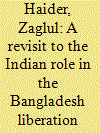

|
|
|
|
|
| Publication |
2009.
|
| Summary/Abstract |
The Liberation War of Bangladesh was seen by the Indian policy makers as a prime time to dismember Pakistan. By the creation of Bangladesh, they pondered: (a) the political enemy on both its borders would be replaced by a far weaker enemy on one side and a friend on the other; (b) secularism would be regarded as a dominant ideology for the developing countries; (c) India would emerge as an Asian superpower; (d) India would establish a subservient government in Bangladesh; (e) Bangladesh would be an extension of the Indian market; (f) India would materialize the Nehruvian vision of the Greater Indian Union.
|
|
|
|
|
|
|
|
|
|
|
|
|
|
|
|
| 2 |
ID:
164533
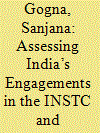

|
|
|
|
|
| Summary/Abstract |
The INSTC formalised by India, Iran and Russia at the start of the new millennium to develope an alternative transport system linking India with Central Asia and Eurasia floundered for long due to scepticism and neglect by its member states. However, the withdrawal of the UN sanctions against Iran, the steady expansion of the Chinese influence in the region through the OBOR, and the urgent requirement of the land-locked Central Asian countries to gain maritime access offer new incentives for the member states to reinvigorate the project. This article explores the commercial and the strategic implications of the INSTC for India in the present context. .
|
|
|
|
|
|
|
|
|
|
|
|
|
|
|
|
| 3 |
ID:
130176
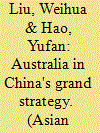

|
|
|
|
|
| Publication |
2014.
|
| Summary/Abstract |
This paper examines China's strategic interests in Australia. From the security per- spective, Beijing hopes that Australia will be a constructive factor for its peaceful rise. On the economic side, Beijing hopes that the bilateral relationship will ensure sufficient and sustainable resources and energy supplies from Australia for China's domestic needs
|
|
|
|
|
|
|
|
|
|
|
|
|
|
|
|
| 4 |
ID:
141786
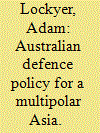

|
|
|
|
|
| Summary/Abstract |
There is a growing consensus among defence planners that Australia is in need of a new defence policy that better suits the strategic realties of an emerging multipolar Asia. After assessing the implications of shifting regional power balances for Australia, this article advances the argument that Australia should redirect its attention back to its immediate north: the “Indo-Pacific Arc”. Indonesia, Singapore and Malaysia have always been vitally important to Australia’s long-term security and, being the gateway between the Indian and Pacific oceans, their strategic value is set to dramatically increase in the multipolar Asia. Finally, this article develops the case for Australia to partner with its neighbours to stem the political and military influence of outside powers into the Indo-Pacific Arc.
|
|
|
|
|
|
|
|
|
|
|
|
|
|
|
|
| 5 |
ID:
162451
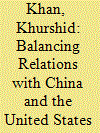

|
|
|
|
|
| Summary/Abstract |
It is always a risky affair, especially for a weak state to strike the right balance while
dealing with two great powers having serious conflicting interests in a particular
region. For a country like Pakistan which remains dependent on foreign aid, running
an independent foreign policy seems quite difficult. While Pakistan’s relations with
China continued to remain smooth throughout history, its relations with the United
States has been more of a roller coaster than a smooth ride but still both could never
be too apart from each other because of various compelling reasons. Currently,
China and Pakistan are extensively engaged in promoting their mutual economic
and strategic interests that go against the U.S. interests. Therefore, in the case of a
possible conflict between United States and China, Pakistan might be trapped in
a catch-22 because it cannot afford to infuriate the United States beyond certain
limits. In such a trap, staying neutral might be even riskier. Slow and steady change
in the status of Gilgit–Baltistan beyond a certain level for promotion of the China–
Pakistan Economic Corridor (CPEC) would also be a serious trap. Pakistan could
afford to lose economic benefits of the CPEC but it cannot afford to give up its
claim over Kashmir which remains the “lifeline” for its survival. Pakistani Generals
fighting on exterior fronts must therefore, make smart moves to ensure that at no
stage should Islamabad be compelled to put all its eggs in one basket.
|
|
|
|
|
|
|
|
|
|
|
|
|
|
|
|
| 6 |
ID:
178658


|
|
|
|
|
| Summary/Abstract |
This paper closely scrutinises NATO engagement, particularly the The Eastern Flank countries in the Middle East. Our main argument is that the quantitative approach to free riding is useful only when it comes to black-and-white policy choices and either-or policy decisions. Simultaneously, it fails when we are faced with more complex situations in which evaluations go beyond the very simple numerical markers, such as the 2% threshold of defence spending. By bringing together a unique regional focus (the European East and the Middle East), theoretical dilemmas (free-riding) and policy issues (NATO's multilateral framework of co-operation understood in terms of strategic interests and practical engagement), we are able to show that Romania is a subtle free rider, which cannot be verified by merely looking at numbers alone, but can be ascertained by a careful qualitative analysis which reveals a discrepancy between the country's strategic interests and its level of engagement.
|
|
|
|
|
|
|
|
|
|
|
|
|
|
|
|
| 7 |
ID:
124758
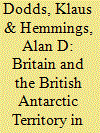

|
|
|
|
|
| Publication |
2013.
|
| Summary/Abstract |
Britain's contemporary and future relationship with the British Antarctic Territory and the wider region is the subject matter of this article. In the aftermath of the ill-fated plans for a merger of British Antarctic Survey (BAS) and the National Oceanography Centre, it is timely to ask how the UK projects influence and secures its scientific, resource and strategic interests. The contemporary Antarctic is increasingly characterized by tension over resource management and conservation politics as Antarctic Treaty parties disagree, both in private and public, over the purpose of legal instruments and the regulation of activities such as fishing and marine conservation. While we do not predict the collapse of the Antarctic Treaty System (ATS), our analysis suggests that the effectiveness and legitimacy of the ATS is increasingly under challenge. The United Kingdom's position as a claimant state and original signatory to the Antarctic Treaty is complicated by the presence of counter-claimants (Argentina and Chile) and a wider preoccupation with other overseas territories, such as South Georgia and South Sandwich Islands and the Falkland Islands. Polar science, carried out by BAS and other British agents, remains critical not only for maintaining the UK's 'soft power' but also increasingly for cementing a 'strategic presence' in the Antarctic. The article ends with a cautionary note: scientific excellence is no longer sufficient to guarantee geopolitical/strategic interests and there is growing evidence that claimant and non-claimant states alike are no longer regarding Antarctica as an area that will remain free of intensifying and diversifying resource exploitation.
|
|
|
|
|
|
|
|
|
|
|
|
|
|
|
|
| 8 |
ID:
072679
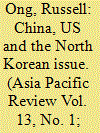

|
|
|
|
|
| Publication |
2006.
|
| Summary/Abstract |
This article explores the strategic interests of China and the US in the North Korean issue. It examines their different perceptions of North Korea. For China, North Korea is needed as a friendly buffer state as well as a political ally. As the lone superpower and lynchpin of international security, the US wants to stop unpredictable North Korea from further developing its nuclear capabilities. The article then explores the shared goal of both great powers in promoting stability on the Korean peninsula and in preventing nuclear proliferation. It is argued that the interplay of Sino-US security interests has a huge impact on the evolution of the North Korean issue.
|
|
|
|
|
|
|
|
|
|
|
|
|
|
|
|
| 9 |
ID:
110048
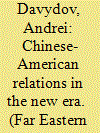

|
|
|
|
|
| Publication |
2011.
|
| Summary/Abstract |
The article analyzes relations between China and the United States over the last two and a half years. The author concludes that as a result of laborious negotiations, the two sides have now managed to develop a kind of paradigm for reciprocal behaviour that allows them to settle problems and disagreements arising between them on a non-confrontational basis. In preparing this article, the author used data from works he published earlier, along with analytic materials from the Russian Academy of Sciences' Institute for Far Eastern Studies that he helped compile.
|
|
|
|
|
|
|
|
|
|
|
|
|
|
|
|
| 10 |
ID:
133694
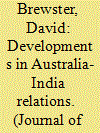

|
|
|
|
|
| Publication |
2014.
|
| Summary/Abstract |
India and Australia have the potential to become important strategic partners in Asia as part of a coalition that could help manage the changing balance of power in the region. But while India and Australia share many strategic interests, both countries still have a lot to learn about how to get along with each other. Some might even see them as the odd couple of the lndo-Paci?c. This paper looks at recent developments in the relationship in the areas of security, politics and economics, and the prospects for a closer partnership under the new Modi government.
|
|
|
|
|
|
|
|
|
|
|
|
|
|
|
|
| 11 |
ID:
130940
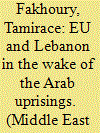

|
|
|
|
|
| Publication |
2014.
|
| Summary/Abstract |
Lebanon is a multisectarian state in which Muslim and Christian groups share political power. The executive elite is composed of a Maronite president, a Shiite speaker of parliament and a Sunni prime minister. The legislature is split 50-50 between Muslims and Christians, and communities enjoy educational and religious autonomy. Two pacts act as regulatory frameworks for these political arrangements: the 1943 National Pact and the 1989 Taif agreement, which put a halt to Lebanon's 15-year civil war (1975-90).
While Lebanon's prewar political system (1943-75) was often framed as a paradigmatic case of consociational or power-sharing democracy,1 most observers today agree that this system is an anarchistic model for the devolution of power. 2 Sectarian3 politics feeds on patronage ties and foreign alliances through which communities vie for control over resources. It further reifies partisanship in external conflicts.
|
|
|
|
|
|
|
|
|
|
|
|
|
|
|
|
| 12 |
ID:
130939
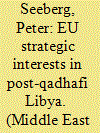

|
|
|
|
|
| Publication |
2014.
|
| Summary/Abstract |
Since the fall of Muammar Qadhafi in 2011, a legitimate monopoly over the means of violence has not been in the hands of the Libyan state. The military confrontation between the regime and what the international media called the "rebels," supported by the NATO no-fly zone, ended in October 2011. However, in 2012 and especially in 2013, Libya witnessed an escalating conflict pitting the democratically elected government and the Libyan state against armed groups and militias. For the EU, this is a challenge to its strategic interests, primarily security in the Mediterranean and secondarily migration and the development of Libya.
|
|
|
|
|
|
|
|
|
|
|
|
|
|
|
|
| 13 |
ID:
130060
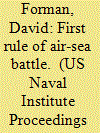

|
|
|
|
|
| Publication |
2014.
|
| Summary/Abstract |
When it comes to the much-discussed concept, misconceptions abound; the first thing to fix may be the nomenclature itself.
If there were a first rule of Air-Sea Battle (ASB), it should be: "Do not talk about Air-Sea Battle." The cloud of confusion and criticism surrounding the concept is undermining this Department of Defense 21st-century warfare initiative. When the world's only superpower announces something called "Air-Sea Battle ," the rest of the world listens, and the DOD must get it right. Failure to correct current misunderstandings about the idea could lead to unintended and unwanted consequences counter to U.S. strategic interests. It is time for Air-Sea Battle 2.0, and step one is changing the name.
|
|
|
|
|
|
|
|
|
|
|
|
|
|
|
|
| 14 |
ID:
082394
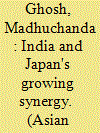

|
|
|
|
|
| Publication |
2008.
|
| Summary/Abstract |
In the post-Cold War era, India and Japan have been moving closer. The possibility of a comprehensive engagement appears quite likely. This article analyzes the new phase of improved Indo-Japanese bilateral relations and explores the variables contributing to this emerging trend. It also examines continuing obstacles to fully cementing "strategic" relations between the two countries
|
|
|
|
|
|
|
|
|
|
|
|
|
|
|
|
| 15 |
ID:
133696


|
|
|
|
|
| Publication |
2014.
|
| Summary/Abstract |
The dynamics of the Indian Ocean region have great economic and political implications - particularly for South Asia. It has always been an arena of power struggle. it has become much more vibrant in the post Cold War scenario, particularly after the collapse of the Soviet Union as a dominant player in world politics. As far as India is concerned, it is considered to be the largest and the most geostrategically located country in the Indian Ocean, with a substantially long coast line. Therefore, any disturbance to the stability of the Indian Ocean region has a direct impact on India's security. Indian Ocean being the only ocean named after a particular country has been viewed as India's backyard by Indian strategic thinkers.
|
|
|
|
|
|
|
|
|
|
|
|
|
|
|
|
| 16 |
ID:
079171
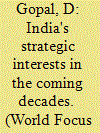

|
|
|
| 17 |
ID:
133695
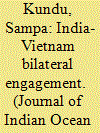

|
|
|
|
|
| Publication |
2014.
|
| Summary/Abstract |
Both India and Vietnam belong to a region that holds enormous potential, but also many challenges. We have a strong convergence of interests in working together, and with others in the region, for a stable, peaceful and prosperous Asia. ....Vietnam's emergence as one of the most vibrant economies in the Asia Pacific region is greatly welcomed by India, especially because we regard Vietnam as a trusted and privileged strategic partner and an important pillar of our Look East Policy".
|
|
|
|
|
|
|
|
|
|
|
|
|
|
|
|
| 18 |
ID:
140470
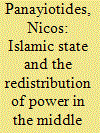

|
|
|
| 19 |
ID:
087808
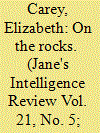

|
|
|
| 20 |
ID:
092676
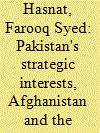

|
|
|
|
|
|
|
|